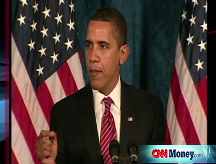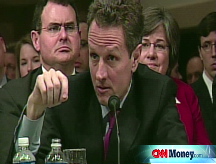Obama takes stimulus package on the road
Hoping to garner support, President Obama takes a campaign-style trip to Elkhart, Ind., to hold a town hall meeting.
WASHINGTON (CNN) -- With Congress bogged down on his administration's $800 billion-plus stimulus package, President Barack Obama is hoping to rally public support with a brief campaign-style road trip Monday, heading to a part of the country particularly hard hit by the economic downturn.
Obama will employ the so-called "bully pulpit" of the presidency by holding a town hall meeting in Elkhart, Indiana - a city that has seen its unemployment rate triple to more than 15% over the past year.
"We aren't in Elkhart to explain Washington's process to them, but instead to highlight for Washington the problems and pain facing Americans," White House Press Secretary Robert Gibbs said.
The trip is Obama's first major face-to-face meeting with a group of ordinary Americans outside of Washington since taking office January 20th.
It also marks a return to the spot of one of the president's greatest political triumphs in the 2008 campaign. Obama stumped for votes in Elkhart twice last year - in May and August - before becoming the first Democrat in 44 years to carry the typically reliably Republican state of Indiana.
The president is expected to make an additional push for the stimulus plan Monday night with a prime time White House news conference. He's also planning a second campaign-style swing tomorrow, heading to Fort Myers, Florida --another city wrestling with double-digit unemployment.
Obama's road trip comes only hours before a key Senate vote on his stimulus plan. Senate Democrats, led by Majority Leader Harry Reid, are trying to win 60 votes in order to cut off debate and force a final vote on the plan as early as Tuesday.
To do so, however, Democrats need to win at least a handful of GOP votes, a feat which so far is proving to be exceedingly tough. The House of Representatives passed its version of the stimulus plan with no Republican support.
Leading Senate Republicans warned Sunday that the administration's stimulus plan will lead to what one called a "financial disaster."
"Everybody on the street in America understands that," said Sen. Richard Shelby, the ranking Republican on the Senate Banking Committee. "This is not the right road to go. We'll pay dearly."
Shelby, of Alabama, told CNN's "State of the Union" that the package and efforts to shore up the struggling banking system will put the United States on "a road to financial disaster."
But Lawrence Summers, the head of the administration's National Economic Council, said Republicans have lost their credibility on the issue.
"Those who presided over the last eight years - the eight years that brought us to the point where we inherit trillions of dollars of deficit, an economy that's collapsing more rapidly than at any time in the last 50 years - don't seem to me in a strong position to lecture about the lessons of history," Summers told ABC's "This Week."
Obama and Democratic leaders argue that the roughly $830 billion measure will help pull the U.S. economy out of its current skid. Much of the package involves infrastructure spending, long-term energy projects and aid to cash-strapped state and local governments.
In a concession to Republicans, about a third of the bill involves tax cuts - a product in part of Democratic negotiations with a small group of Senate GOP moderates, including Pennsylvania Sen. Arlen Specter and Maine Sens. Susan Collins and Olympia Snowe.
The nonpartisan Congressional Budget Office reported last week that the measure is likely to create between 1.3 million and 3.9 million jobs by the end of 2010, lowering a projected unemployment range of 8.7% by up to 2.1 percentage points.
But the CBO also warned that the long-term effect of that much government spending over the next decade could "crowd out" private investment, lowering long-term economic growth forecasts by 0.1% to 0.3% by 2019.
As Congress continues to debate the stimulus plan, the administration is also readying a second phase of the financial bailout program launched by the Bush administration last fall.
Shelby said Obama and his advisers need to address the staggering bank system first. "Until we straighten out our banking system, until there is trust in our banking system, until there's investment there, this economy is going to continue to tank," he said.
Shelby also has been critical of other efforts by the federal government to help the struggling economy, including legislation that would have provided a bailout to the auto industry.
But Sen. Kent Conrad, the chairman of the Senate Budget Committee, told CBS Sunday that the current recession - which already has produced an unemployment rate of 7.6% - is in danger of a deep downturn "like we saw in the Great Depression."
"If there is a failure to give a significant boost to this economy, this crisis will only deepen and become far more serious," said Conrad, D-North Dakota ![]()



